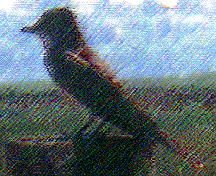|
|
|||||||
|
January 3, 1999 |
|
marine mammal as allegory |
|||||
|
|
|
|
|||||
|
Copyright © 1998, Janet I. Egan |
|
We'd been hearing dire weather forecasts for several days and feared the predicted storm would interfere with our going to the Moby Dick Marathon. After much discussion, we decided to drive to New Bedford on Saturday, ahead of the storm (which was then predicted to hit at midnight) and be safely in a motel from which we could walk to the Whaling Museum in the morning, or at least not have far to drive. Nancy called the museum and they recommended the Seaport Inn in Fairhaven, not walking distance but pretty close. Seaport Inn was not answering the phone so I whipped out my brand new guidebook to Massachusetts. Of the places listed, the Spouter Inn looked to be closest to the museum and the most appealing: "a fortress-solid old granite building on the downtown waterfront... breakfast in the rooftop restaurant overlooking the fishing fleet...". Too bad their 800 number says it's been disconnected and the answering machine at their regular number answers as a culinary school or something. So we finally just drove down there to see if we could find a place. We found the Seaport Inn closed for renovations since December 20 and we concluded the Spouter Inn must be a joke, that being where Ishmael lodged on his arrival in New Bedford to commence his whaling voyage. We settled in at the Days Inn next to the New Bedford Airport. Down the street from the Days Inn we found Riccardi's for dinner, an unexpected find not in the guidebook. It seemed pretty popular judging by the crowds waiting to be seated. I can't remember when I've had such tender eggplant - baked not fried. And the bread - mmm, they make it on the premises every day. They even had a fireplace to warm things up. There was still no sign of the storm when we left Riccardi's and settled in for a night of reading aloud from Thoreau's journal for 1851, seeking all the winter weather passages, and from the WPA guide sections on New Bedford and Fairhaven. Thoreau seemed like a reasonable preparation for a day of Melville. A lot of the same themes come up. Nancy woke me up in the morning with the news that it didn't look like there'd been a storm at all. Looking out the window, sure enough no sign of snow or ice that hadn't already been there yesterday. Breakfast at the Shawmut Diner, a classic 1950's gleaming metal diner with a red neon Indian, fit the pilgrimage mood with an excellent Greek omelet with fresh spinach and really good feta for me and incredible French toast for Nancy. They even had a tiny model of the Modern Diner in Pawtucket behind the counter. The owner/radio host read at one of the Moby Dick readings we went to - maybe the first year - and does a national radio show about diners. There's little tiny diners with model '50's cars all over the place. We felt some rain just starting as we left the diner, but it was barely drizzling as we walked up Johnny Cake Hill to the museum. I could feel that pilgrimage feeling as we entered the museum. I really do get excited by this event. This year they had a bigger crowd than either of the previous two years, including many of the same faces we saw the first year and last year as well, twenty relatives of Melville descendants, Barney Frank, the mayor of New Bedford, and a minister who went to seminary with Tom. Before the reading started people were already signing up for next year, Moby Dick 2000. I tried to jot down some impressions in my notebook:
The storm did come, but in New Bedford it consisted of drenching rain and raging winds. My umbrella turned inside out when we crossed the street to the Seamen's Bethel but it wasn't raining hard enough yet to soak us. We could hear the wind howling and see the rain beating against the windows as the minister read the sermon. It made me want to repent! I wandered around the museum a little bit during chapters that didn't particularly grab me. I could hear the wind and rain pounding the roof in one of the galleries. It sounded like the museum was under attack. Parts of the building seemed to have a leaky roof and museum staff had strategically placed plastic buckets under the drips. If I stood in the right place, I could hear the metal roofing banging, the rain dripping into buckets, and the voices of the marathon readers filtering up from the Lagoda room. In the eight and a half hours that we lasted, we heard two readings in Portuguese, one in Russian, and one in Icelandic. They were up to about chapter 42 - the long discourse on the symbolism of white - when we left. |
|||||
